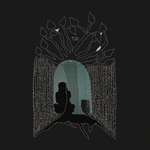|
|
 |
Dusted Reviews
Artist: Tara Jane O'Neil Album: A Ways Away Label: K Review date: Jul. 23, 2009 |

|
|
|
 |
A listener could be forgiven for falsely remembering chirping-cricket sound effects on the new Tara Jane O’Neil album, A Ways Away. Some combination of sleigh and gamelan bells, gently picked rhythm guitar, and distant-sounding tambourines infuses the album with a dusky, end-of-day quality. From the slow, spacious opener “Dig In” to the even slower, fuzz-and-reverb instrumental “The Drowning Electric,” the album’s languid, major-key songs seem themed to bridge twilight and darkness.
This temporal vibe marks a departure from O’Neil’s previous work, which worked well as soundtrack for musing on the cracks in your bedroom ceiling on a rainy day (complete with legit rain effects). Like her other recent work, the songwriting on A Ways Away is significantly more accessible than those early solo albums. On Peregrine (2000) and In the Sun Lines (2001), O’Neil’s crystalline voice rose over elaborate, sometimes obtuse chord patterns and melody lines that seemed closer to math-rock than to any conventional singer-songwriter tunes. You Sound, Reflect (2004) saw her write perhaps her first whistle-able tune, “The Poisoned Mine,” and ditch some of the more obtrusive electronic effects she had begun to employ; the songs on In Circles (2006) veer toward folk-rock.
A few songs here lean folk-ward, too, particularly “Drowning,” which has a British Isles lilt to it. But O’Neil’s work here stands distinct from the waifish, precious female songwriters that top Dusted charts in this day and age. Her lyrics are typically disillusioned (see especially the melancholy reworking of her older song “Howl”), her instrumental work impeccable, and her music free of pretension. Something about the record – the sad warmth, the particular fuzz-tone of the guitars – harks back less to obscure ’60s folk musicians than to the quieter moments of the indie-rock scene1990s: her own work in Retsin, her collaborators from Ida, the gentler drones of Yo La Tengo or the American Analog Set. Rather than making yet another stylistic jump, she seems now to be building on close, familiar influences.
Detractors often accuse O’Neil of making monotonous records. She succeeds in a rare feat here, making a mood-sustaining record comprised of songs that only improve when listened to in sequence. Take the transition from the tape-delay whirs at the end of “Pearl Into Sand” into the opening chord progression of “Beast, Go Along”: a gradual, enveloping build into a few seconds of genuine beauty.
By Talya Cooper
|







